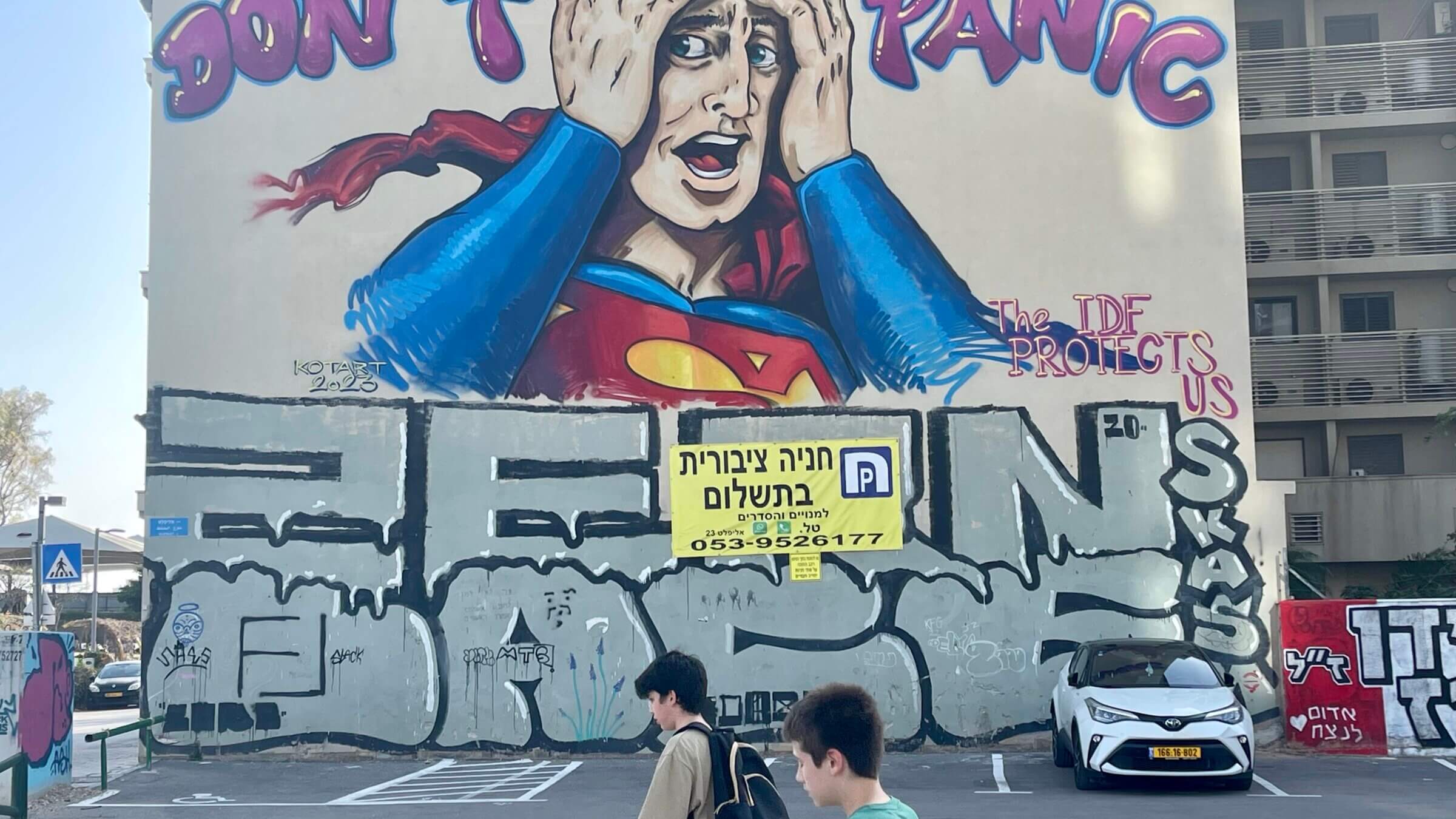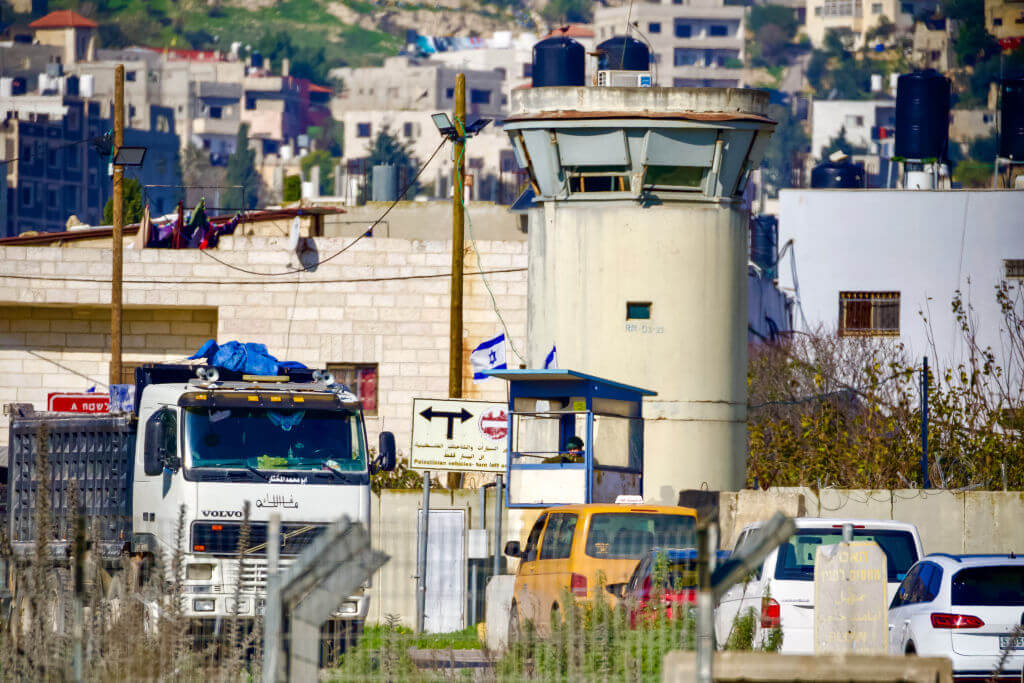Reporter’s Notebook13 things about Israelis in wartime I’ve noticed by living among them
Where it’s easy to get weed or a MAGA yarmulke, but you won’t see many images of suffering in Gaza

A mural in Tel Aviv’s Florentine neighborhood captures the mood in post-Oct. 7 Israel. Photo by Susan Greene
TEL AVIV – On the light rail one recent morning, I watched a couple riveted by videos of street killings in Haiti, and counted how many times a mother and daughter replayed footage of a cancer-stricken King Charles greeting the public after his Easter service: three.
One thing I almost never see when I rubberneck to peek at the cell phone screens around me throughout Israel: images of suffering in Gaza.
Israeli television and other news outlets carry remarkably less coverage of the humanitarian crisis 40 miles away than their counterparts back home in Denver. From my vantage point, it seems like the Princess of Wales’ doctored family photo had more visibility here than the images the rest of the world is seeing of Palestinians killed, wounded, displaced and starving.
Those images are, of course, accessible on the internet — although the Knesset passed a law Monday giving the government power to immediately shut off Al Jazeera and other foreign networks broadcasting here if they’re deemed to be a threat. But most Israeli Jews I’ve asked say they aren’t seeking out news from Gaza because they’re too shaken by the deadly Hamas massacre on Oct. 7 — or too furious about it to focus on the impact of Israel’s response.
“The Israeli media traditionally is very patriotic, very pro-government, when it comes to military confrontations with our neighbors,” Amit Schejter, a communications professor at Ben-Gurion University of the Negev, told me. “Besides, it’s almost a natural response to first of all worry about the suffering of your own people before wanting to hear about the suffering of others.”
As the Forward’s correspondent in Israel since January, I’ve spent most of my time interviewing Israelis affected in one way or another by Oct. 7 and its aftermath. It’s my first time living in the country (versus visiting as a tourist), and along with the dearth of images from Gaza, I’ve noticed a number of things that don’t fit neatly into my news stories yet help me understand the society around me. Here are 13 of them:
1. Israelis are worried about you.
News reports here are so full of stories about antisemitism abroad that many Israelis seem convinced that Jews in the diaspora are in mortal danger.
I have two sons at the University of Colorado. where some students have rallied for a ceasefire and a Palestinian state. Israelis tend to assume I fear for their safety, which I do not. My boys are somewhat concerned about mine, though (see No. 2).
2. The Iron Dome system really works.
More than 11,500 rockets have been launched from Gaza or Lebanon since Oct. 7, according to the Israel Defense Forces. The vast majority have been intercepted by Iron Dome, the missile-defense system started in 2011 and financed by more than $2 billion in U.S. aid.
When a missile siren blared as I waited at a bus stop my first week in Tel Aviv, I could see an Iron Dome interceptor arcing overhead seconds later on its way to knock the rocket away from the urban core, like in a video game.
Judging from how the faces around me turned from terror to relief, I wondered how many Israelis would feel safe enough living here without that system. “We’re in love with our fireworks,” Gideon DeBeer, a retired United Nations worker living in Jaffa, told me. “Every day in Israel is like the Fourth of July.”
3. Israel smells like weed.
Marijuana is only legal for medicinal purposes in the Holy Land, but I’ve smelled pot in an IT company headquarters in Herzliya, at the Western Wall in Jerusalem’s Old City, and inside a bomb shelter near Kibbutz Be’eri. “It helps take the edge off,” the father of a kidnapped Nova attendee told me while toking up outside the hostage family headquarters in Tel Aviv.
4. There are dogs everywhere

I mention this mainly because, in my book, they also help take the edge off. I’ve been carrying a small hairball from my own doodle, Hymie, who stayed home in the U.S., but it and our Zoom calls have left me wanting. It has helped to have dogs to love up as I roam around Israel, and a friend-of-a-friend’s miniature poodle named Naknik (Hebrew for “hot dog”) to walk here in the city known as “Kelaviv.”
Though there are pet-food stores every few blocks here, I’ve also noticed several of my neighbors making home-cooked meals for their dogs. A woman in the building across the street prepares chicken liver for her beagle’s breakfasts and steak for his dinners. I saw her a few weeks ago carrying a bag of meat from the Wagyu beef butcher down the street, and told her it made me think about the starvation in Gaza.
“Apples and oranges,” she said, and has been ignoring me since.
5. There are a gazillion pollsters.
One phoned me in March pitching a story on Israelis’ opinion of Sen. Chuck Schumer after he called for a ceasefire and new elections to replace Netanyahu. Another offered data on the number of Israelis who planned to dress up for Purim.
5a. And possibly even more think tanks!
Puts Washington to shame.
5b. Plus a nonprofit for pretty much everything.
Like the one that’s working to evacuate donkeys stressed out by the war to France.
6. Israel loves Trump.
Banners celebrating the 45th president of the United States are starting to rival posters of Rebbe Menachem Mendel Schneerson in some Haredi communities. You can also buy MAGA yarmulkes or boxer shorts in even the most liberal Tel Aviv neighborhoods. “He’s good for the Jews” is a refrain you often hear about former President Donald Trump, especially among millennials, who often are more conservative than their grandparents.
7. Few Jewish Israelis really seem to know Arab Israelis or Palestinians in the occupied West Bank, and vice versa.
What’s more, many Jewish Israelis I’ve interviewed don’t discern between Hamas militants and Gazans unaffiliated with the terror group. “They’re all the same,” one man told me on a bus to Haifa.
I’ve also been struck by how many Israelis dismiss the number of war dead reported by the health ministry in Hamas-run Gaza (32,782 as of Monday), and how many doubt that Gazans are facing starvation, as news outlets worldwide and international aid agencies have documented.
And I’ve heard several Israeli Jews say that Palestinians don’t value life or love their children as much as they do. I wonder what makes them so sure of this, given how few have deep or direct relationships across the divide.

8. It’s hard to find a proper reporter’s notebook here.
Not that I’m embarrassed by the Hello Kitty diary I’ve been using over the past week.
9. How divided this nation is along religious lines.
The tension between Haredi and non-Haredi Jews is palpable. A yeshiva leader, during an interview, described secular Israeli Jews to me as “godless goys.” And a demonstrator at an anti-Netanyahu rally in Caesarea told me he hopes not for a two-state solution with Palestinians, but a “three-state solution” that divides land between Palestinians, Haredi Jews and secular Jews. “Dead serious,” he said when I asked if was joking.
10. A two-state solution sounds absurd to most Israeli Jews I’ve interviewed.
Even ones who were working toward that outcome before October. The Hamas attack quashed dreams of peace among scores of Israelis who see this as the least likely time in their nation’s history that they would embrace Palestinian independence.
Israelis also laugh at the Biden administration’s idea of the Palestinian Authority running Gaza after the war. It’s not that they have a better idea, necessarily, just that they do not have any tolerance for outsiders proposing quick fixes to problems many here are convinced are too complex for outsiders to understand.
11. Israelis seem unfazed about becoming internationally isolated.
If folks here are hurt by the concerts, art exhibits or book signings being canceled abroad, they barely show it — or dismiss it as pure antisemitism (see No. 1).
A friend who works as a literature professor in Jerusalem was scheduled to speak at a symposium in London later this spring, but organizers nixed her and her Israeli colleague from the agenda. “This is nothing new for Jews,” she said. “People have been canceling us throughout our history.”
I’ve heard similar responses to the United Nations’ ceasefire resolution and to news that countries have been snubbing Israeli sports teams. The narrative here is that Israelis are being criticized and canceled because they’re Jewish, not because of objections to the war (and the occupation).
12. Protesters here seem tired.
I’ve been covering political demonstrations for decades — for abortion rights and against the wars in Iraq and Afghanistan; outside Timothy McVeigh’s execution in 2001 and in the aftermath of George Floyd’s murder by police in 2020. Never before have I seen protests dominated by people in their 60s, 70s and 80s (think the crowd at a James Taylor show at Tanglewood).
The tens of thousands of leftists who show up to weekly protests with their Israeli flags and “Bring them home now” posters in hand know the drill: Don’t drink too much water lest they have to use the port-a-potties, for example, and when to quote Noam Chomsky in interviews. Many, though, say they’ve become cynical.
“A certain fatigue sets in having to fight your government year after year,” Tsur Shezaf, 65, a writer from Jaffa, told me at a train station Sunday as I went to cover the start of a four-day anti-Netanyahu vigil in Jerusalem.
13. How willing Israelis are to talk.
I came here from Colorado, where asking a hard question often gets the door slammed in my face. Israelis, in comparison, seem to relish hard questions and long conversations.
They will look me in the eye deeper than in any country I’ve ever been. They’ll show me pictures of their kids and tell me, on the record and without a hint of self-consciousness, that they’re depressed or just had hemorrhoid surgery or are so worried about Israel’s future that they’ve moved all their money overseas and feel guilty about it.
They’re comfortable crying in an interview and laughing so hard that coffee comes out of their noses. They’ll teach me Hebrew words and call me hours later to quiz me on them, or meet me on a bus one day and invite me for Shabbat dinner the next.
They will let me know how messed up their government is — and then remind me in painstaking detail of what’s messed up about mine. And they will tolerate my questions, but not without questioning, justifiably, what kind of self-respecting journalist does interviews with a Hello Kitty notebook.






















